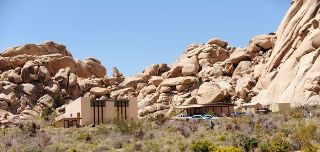Dec 12 2014
Three natural reserves managed by the University of California, Riverside will be involved in an ambitious plan to use the UC Natural Reserve System (NRS) to detect and forecast the ecological impacts of climate change in California.
 The Jack and Marilyn Sweeney Granite Mountains Desert Research Center is managed by UC Riverside. Photo credit: Timothy Wood.
The Jack and Marilyn Sweeney Granite Mountains Desert Research Center is managed by UC Riverside. Photo credit: Timothy Wood.
The three reserves are: the Jack and Marilyn Sweeney Granite Mountains Desert Research Center, the Phillip L. Boyd Deep Canyon Desert Research Center, and the James San Jacinto Mountains Reserve.
The brainchild of UC Santa Cruz researchers, the plan includes the establishment of a UC-wide Institute for the Study of Ecological and Evolutionary Climate Impacts (ISEECI). The proposal to establish the institute, which involves all of UC’s nine undergraduate campuses, has received $1.9 million in funding, the largest of the new President’s Research Catalyst Awards announced by UC President Janet Napolitano on December 10.
“This is a very exciting and comprehensive project that will compare the changes in climate across the entire state of California and in every critical habitat in the state,” said Kimberly Hammond, the director of the UC Riverside Natural Reserve System and a professor of biology. “Two of the UC Riverside reserves are in the desert regions – Granite Mountains in the high desert and Deep Canyon in the low desert – which are arguably the places where the effects of climate change will be seen both earliest and most acutely. The third UC Riverside reserve, James Reserve, represents one of the southernmost higher-elevation forested habitats of all the reserves in the state.”
Besides Hammond, the UC Riverside researchers who are members of ISEECI are Michael Allen and David Reznick – both faculty members in the Department of Biology.
UC is home to the world’s largest system of university-administered natural reserves, offering an opportunity to model how climate change will affect California ecosystems. UC’s nine undergraduate campuses that will be studying the ecological effects of climate change will involve the participation of both graduate students and citizen scientists.
“We are going to be creating a large network of UC climate researchers and using the NRS system as a climate change observatory for biotic systems,” said UC Santa Cruz biologist Barry Sinervo, a professor of ecology and evolutionary biology, who has led studies documenting the effects of climate change on animal populations around the world. Sinervo will lead ISEECI.
ISEECI researchers will assemble historical records, establish a new system for data collection, and conduct experiments and long-term monitoring studies across the state. Although there have been many in-depth studies documenting climate impacts, they have largely been done independently, with results that are difficult to compare among studies. ISEECI will pursue a coordinated approach across broad geographic scales. Researchers will develop models to predict future changes to ecosystems and potential impacts on ecosystem services that might threaten the capacity of Californians to adapt to a changing climate.
The NRS offers secure study sites where long-term research and experiments can be undertaken by UC faculty and students. The system has many unique features that are unavailable at other reserves or national parks, including:
- proximity to a diverse and ecologically-sophisticated population of university students, volunteer naturalists, docents, and local educators who can engage citizen-scientists and education programs;
- availability of local meteorological stations currently recording high-resolution climate data;
- ability to sample and archive datasets that can be made available online for public access and analysis; and
- collective representation of the range of terrestrial and near-shore marine ecological zones of California.
ISEECI is one of five newly funded projects designed to stimulate UC research in areas that could benefit California and the world. The President’s Research Catalyst Awards will channel $10 million over three years to fund research in areas of strategic importance, such as sustainability and climate, food and nutrition, equity and social justice, education innovation, and health care.
“The President’s Research Catalyst Awards will spur UC research and offer our faculty and students new opportunities for cross-campus, multi-disciplinary collaboration,” Napolitano said. “We want to support research endeavors that have real-world impact in areas with critical needs.”